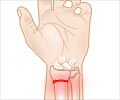A new biosensor that can be applied to the human skin like a temporary tattoo and can alert marathoners, competitive bikers and other extreme athletes when they are about to ‘hit the wall’.
In a development than can have a wide range of application, a new study published in the journal Analytical Chemistry reports on a new biosensor that can be applied to the human skin like a temporary tattoo and can alert marathoners, competitive bikers and other "extreme" athletes when they are about to ‘hit the wall’.
Joseph Wang and colleagues explain that the sensor monitors lactate, a form of lactic acid released in sweat. Lactate forms when the muscles need more energy than the body can supply from the "aerobic" respiration that suffices during mild exercise. The body shifts to "anaerobic" metabolism, producing lactic acid and lactate. That helps for a while, but lactate builds up in the body, causing extreme fatigue and the infamous "bonking out," where an athlete just cannot continue. Current methods of measuring lactate are cumbersome, require blood samples or do not give instant results. Wang's team sought to develop a better approach.
They describe the first human tests of a lactate sensor applied to the skin like a temporary tattoo that stays on and flexes with body movements. Tests on 10 human volunteers showed that the sensor accurately measured lactate levels in sweat during exercise. "Such skin-worn metabolite biosensors could lead to useful insights into physical performance and overall physiological status, hence offering considerable promise for diverse sport, military, and biomedical applications," say the scientists. Future research will further correlate sweat lactate levels with fitness, performance and blood lactate levels, Wang added.
Source-Eurekalert











